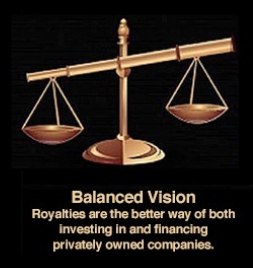
The increasing prices charged consumers for goods and services as imposed by companies are frequently claimed to be justified by the higher cost of raw materials and labor being paid by the companies.
The higher prices can make it possible for the companies to increase or, at least, retain profit margin levels, unless consumers react by not purchasing, or not purchasing as much of the products at the higher price levels.
Therefore, investors in a revenue royalty, which is a percentage of a company’s defined revenues, will have a more assured return than investing in the shares of the same company, since the continuation of revenues is more certain than the prospect for the company’s profit. Also, the royalty investor is not an owner of the company, and therefore is not impacted by the volatility of profits or any P/E multiple thereof.
While the owners of companies which sell revenue royalties to raise operating capital will benefit from being spared equity dilution, there is a cost relating to revenue sharing which results in a reduction of profitability. Therefore, owners should consider an opportunity to negotiate a royalty issuer’s Right of Redemption, which allows for the termination of the payment obligations. The revenue royalties we structure allow a royalty issuer to redeem the royalty agreement if an agreed amount of cumulative payments have been paid to royalty investors within an agreed period. The Right of Redemption effectively caps the return of the royalty investor to a level acceptable by the investor, in the event of the right being exercised.
It should be noted that royalty issuing companies can also make necessary payments to royalty investors, compensating for any shortfall in the projected and agreed cumulative level of payment, if the company wishes to terminate the royalty payments. The necessary funds could be borrowed or be an element of the proceeds from capital received in subsequent financings.
Investors seek to buy royalties from companies they believe are positioned with prospects for favorable revenue increases, and it is also possible for companies to negotiate lower royalty rates if some level of royalty payment is assured. Royalty terms are fully negotiable, and companies may also repurchase royalties from investors at any time on whatever terms are successfully negotiated.
Royalty payments received by American, taxpaying investors, are tax-free until the cumulative amount equals the cost of the investment, and taxable as income thereafter, the same as for dividends. Royalty payments made by issuing companies are generally federal tax deductible. Of course, royalty issuers should engage attorneys and tax advisors, with whom we will be pleased to collaborate
Those interested in further exploring the benefits of investing in or selling royalties should contact me.
Arthur Lipper, Chairman arthurlipper@gmail.com
British Far East Holdings Ltd.
